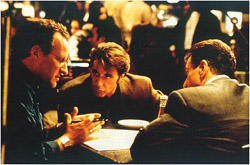What an odd weekend I have had. My housemates and I were feeling in something of a bataillean mood, so we decided to freeze an egg, hoping to chip the shell off and reveal a frosty egg-shaped marvel. It didn't quite work out as planned, since the 'white' didn't remain clear as we expected, but became opaque.
M asked whether, in truly excessive fashion, we urinated on the egg or pulled someone's eye out. No I replied, we didn't. We did pass the slimy defrosting object to each other, but this activity was of a non-sexual nature.
Later I forced my housemates to watch
Derrida Does Dallas. Afterwards, we thought for a short while about the question posed to 'Jacqui': which philosopher would you like to have been your mother?
Except we decided to interpret the question in what might be called a more literal sense (watch the film and you will understand what I mean).
I settled on David Hume. A great thinker with a reasonably pragmatic general outlook. I don't know much about his life, but I do know, from his texts, that was a relaxed sort of chap, and that he believed there is a time and a place for sceptical doubts. For example, I think he would agree to set them aside whilst engaging in certain sorts of parental activities with me.
It would have been a whole lot easier to suggest a 20th Century philosopher for the role, such as Foucault, or a woman, such as Beauvoir, but we thought this would be cheating (let's not consider the political implications of privileging women thinkers for the role).
As for my housemates - Axel muttered a few things, but I don't remember exactly who he decided on, and Lila shouted 'Freud!' from the top of the stairs in an obscure act of defiance.
 Oh the irony. All those post-colonial literature folk forced to drink their tea and coffee in a cafeteria named after the great imperialist Sir Stamford Raffles.
Oh the irony. All those post-colonial literature folk forced to drink their tea and coffee in a cafeteria named after the great imperialist Sir Stamford Raffles.







